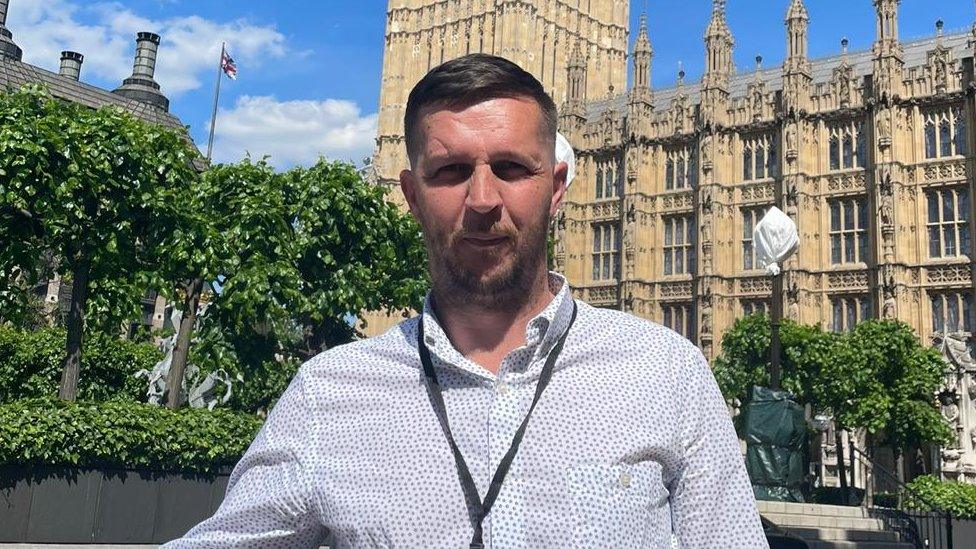Real Living Wage rises by record 10% to £10.90 an hour
- Published
- comments

Some 400,000 workers at businesses that have volunteered to pay the Real Living Wage are set to get a record pay boost.
The hourly rates are rising by £1 to £10.90 across the UK and by 90p to £11.95 in London.
The 10.1% rise, which was brought forward from November, is the biggest in the scheme's 10-year history and meant to reflect soaring living costs.
But critics say some employers faced with rising costs will struggle to afford it.
Launched in 2011, the voluntary Real Living Wage is set by the Living Wage Foundation, external charity. It is higher than the government-set National Living Wage, external - currently £9.50 an hour for those over 23 - and reflects what the charity thinks people need to earn to cover everyday costs.
The number of Living Wage-accredited employers has doubled to 11,000 in the past two years and includes the likes of Ikea, Nationwide and Burberry.
The foundation has increased pay rates after prices rose at their fastest rate in 40 years in the 12 months to August.
The cost of food, energy and fuel has soared since April, although energy bills will be limited from October under government plans to help households and businesses.
Katherine Chapman, director of the Living Wage Foundation, said millions were still facing a "heat or eat" choice this winter.
"Today's new rates will provide hundreds of thousands of workers and their families with greater security and stability during these incredibly difficult times."

What is the 'Real Living Wage'?
The voluntary "Real Living Wage" is set by the Living Wage Foundation, external charity. It is higher than the legal minimum wage, reflecting what the charity thinks people need to earn to cover everyday needs
It is currently £11.95 per hour in London, and £10.90 per hour elsewhere in the UK
More than 10,000 employers throughout the UK have signed up to the policy, covering more than 300,000 workers
The compulsory National Living Wage is £9.50 an hour for anyone over the age of 23

Charles Cotton, senior reward adviser for the CIPD, the professional body for HR and people development, called the pay rise "significant".
But he said it may not be enough to help some of the lowest-paid employees facing the rising cost of living and urged employers to look at other ways of supporting staff.
"As well as offering enough hours for staff to have a decent standard of living, organisations should review aspects of employment such as flexible working, career progression opportunities, and financial wellbeing benefits, for example occupational sick pay or hardship loans," he said.
He said some businesses may struggle to afford the new Real Living Wage as they are grappling with cost increases themselves.

Chris Smallwood who owns Anchor Removals became a Living Wage employer in 2016
The number of employers accredited by the Living Wage Foundation has more than doubled in the past two years to 11,000.
Major new names include the Royal Albert Hall, Aston University, and the ExCeL centre in London.
They join half of the FTSE 100 companies, including Aviva, Everton FC, Ikea, Burberry and Lush as well as thousands of smaller businesses.
There are now also 39 "living hours" employers, such as Aviva and West Bromwich Building Society, which guarantee a minimum of 16 hours work a week and a month's notice of shift patterns.
Chris Smallwood, owner of Anchor Removals, based in Worsley, Manchester said he became a Living Wage employer in 2016.
He said: "When I get up in the morning, I can look myself in the mirror knowing all the good things around me are not at the expense of other people, because I've paid them well.
"Think of the benefit to individuals, but also society, by paying a wage that enables workers to stand on their own two feet."

Gavin Ryan says earning the Real Living Wage has given him stability
Mr Smallwood employs Gavin Ryan who said that when he started working at Anchor Removals 10 years ago he struggled with the wages.
"Now, I have stability and job security, and the wages have helped me move out of my mum's house and into a home with my partner," he said.
"I can also look after my daughter and buy her the things she needs. During the pandemic, my partner lost her job as a travel consultant and went to work for a supermarket.
"Her hours and pay were not great, but because I was earning the Living Wage with guaranteed hours, I knew I could support her. It was a life saver."
However, the general secretary of the Unison union, Christina McAnea, said that lower-paid workers were "still crying out for help".
She called on the government to introduce an increase to the (compulsory) national minimum wage "without delay" to ease the burden for those "feeling genuine financial pain".
